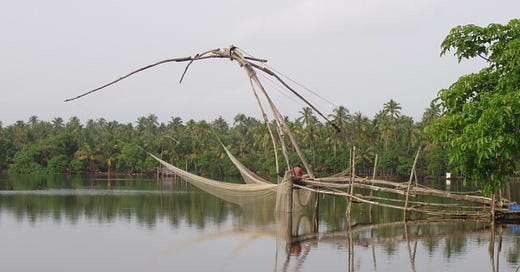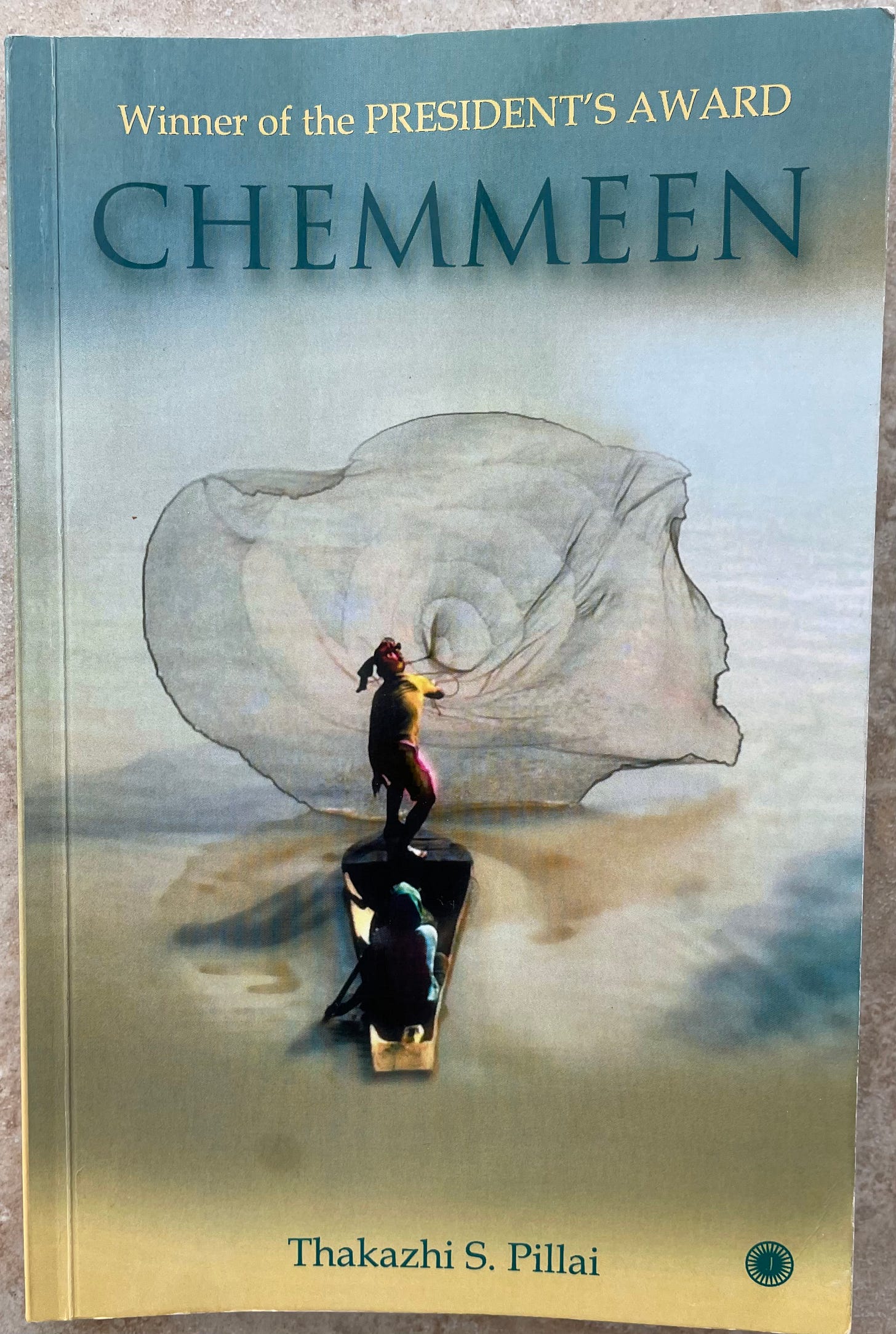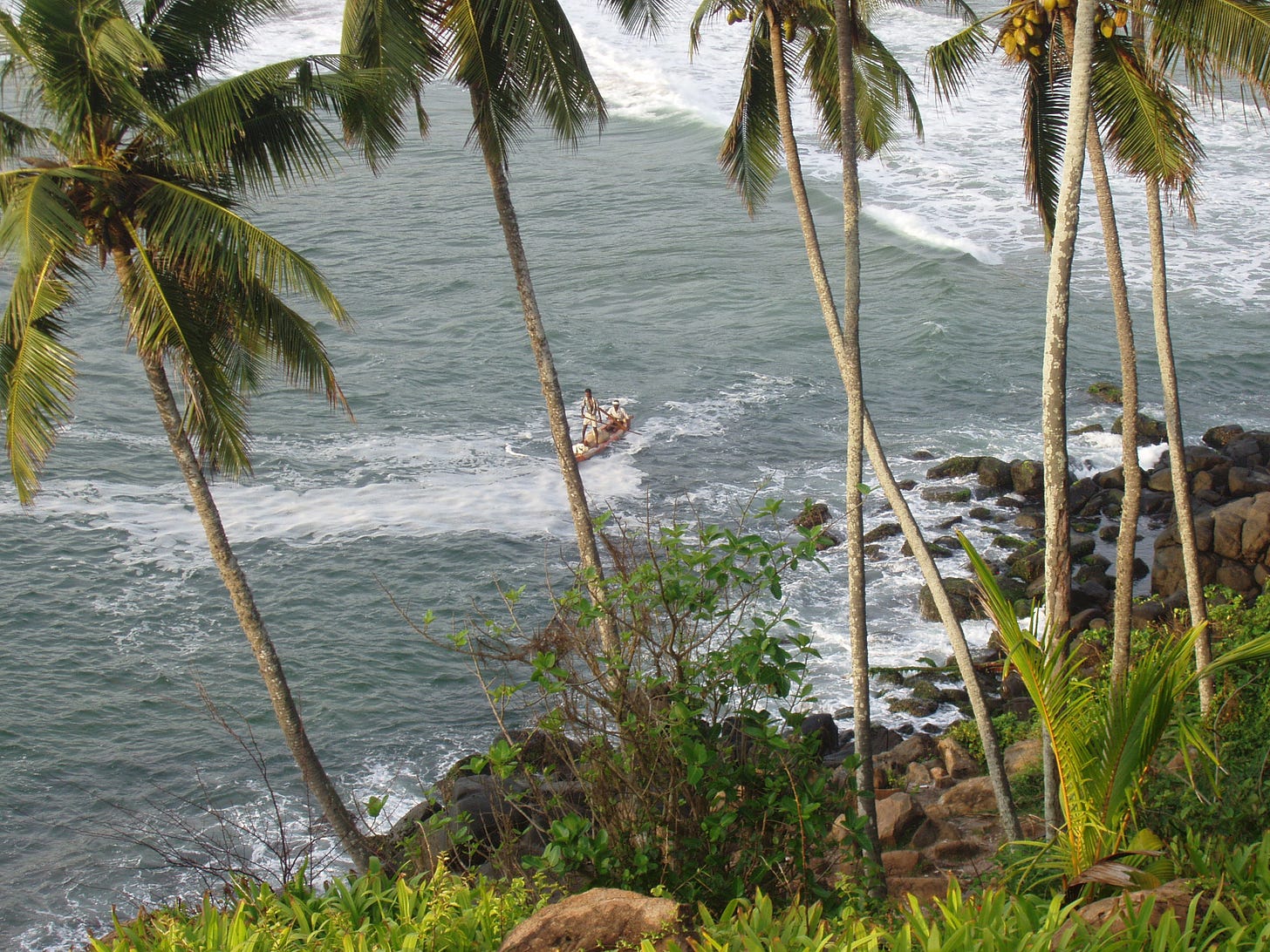A GREAT BOOK BECOMES A CULT CLASSIC
How a book about not crossing the line crossed so many lines

Nine years after Thakazhi Sivasankara Pillai (Thakazhi) published his novel Chemmeen in 1956, the eponymous film went on to win critical acclaim in India and accolades in the film festival at Cannes and Chicago. Chemmeen is a story centered around a tiny fishing community in Alappuzha, Kerala, yet it spoke to the lay person as well as the art critic both in India and abroad. The novel has been translated into many Indian languages as well as Arabic, Russian, German, Italian and French.
The word “chemmeen” in Malayalam means shrimp. After reading the book, it’s clear that the author selected the title with utmost care. The title alludes to the frailty of human beings over the course of their lives. If a shrimp does not have a choice as it swims against the current, rest assured that the mortals don’t either. We’re, after all, as dispensable as the sea creature; if its will is pitted against the design of every other creature in the ocean, so is ours.
I didn’t feel that this translation by Narayana Menon was facile enough a read; yet, I couldn’t put it down. Upon publication in English, the book carried its already eminent writer to even greater glory. It was the first post-colonial Indian novel to be translated into English.
I love the version I own for its introduction in which the late Santha Rama Rau reflects on India’s obsession with the English language. With Chemmeen’s arrival into India’s literary landscape, Rama Rau is particularly thrilled to note that a man working in his provincial language has become a bestseller. She observes that the focus on the English language cost India; Indians neglected their own timeless stories and literature.
The closing line in her foreword is a brilliant segue into the novel itself: “As always, India offers its people a poor living but a rich life,” she writes. It’s the beauty and the pathos of an ordinary life that Chemmeen evokes in scene after scene.
Chemmeen is the story of some of the poorest people in India—fisherfolk by the Malabar coast whose daily survival in never a guarantee. One season alone is rewarding for them: Chagara. This season of plenty is right in the middle of the monsoons, around July, when the water level of the backwaters rises and organic material moves into tranquil parts of the ocean. The fish and prawn swim towards their food at this time. Suddenly, the waters abound in fish. Therefore, on land too, there’s plenty of fish and food for all those whose livelihood depends on the produce of the sea. The community splurges at Chagara because every fisherman’s family can eat well during this time. In the film, this season is captured evocatively in one of the most famous Malayalam songs of all time, a song that I will always associate with my birth and my adolescence. The joy of fishermen is short-lived, just as Chagara itself, so the community lives in abject fear of nature and god. The people in the village of Nirkunnam are expected to live by the law of the land.
From time immemorial, however, the progression of human life has often hinged on lines being crossed. In Chemmeen’s village, alas, the consequences are tragic to those who stray. The inevitability of the novel’s ending is established right at the opening. Two people who may not fall in love yearn for each other. For fisherfolk, marriage is a sacred bond. They must respect their marital vows so that their husbands may return home safely from the arms of the sea goddess, Kadalamma. Anyone who breaks with tradition will face Kadalamma’s wrath. Palani is a hapless husband caught in the triangle of love with his wife, Karuthamma, and trader Pareekutti.
In a moment aching with the despair of their lives, Thakazhy makes a powerful statement about the professions people pursue and the idealistic values they hold dear to them. Palani tells Karuthamma that a fisherman is doomed from the start anyway.
“He makes his money by cheating and catching innocent beings moving freely in the sea. To look upon those millions dying with their eyes open is nothing to those who see that sight every day. But you cannot save money made at the cost of innocent lives. It is not possible. Otherwise, why should fishermen starve?”
Yet, according to Thakazhy, it’s also true that if a fisherman plays by the rules established by the people on land and by the deity of the sea, fisherfolk can survive. They may not thrive, but they will certainly survive.
In Chemmeen, one man certainly thinks he is above all the rules. Karuthamma’s father, Chemban Kunju. He shirks his duty—in the eyes of the fisherman community in Nirkunnam—and gets into debt in order to buy a boat. He does so before he seeks to get his daughter wedded. She has come of age and that indifference in arranging the girl’s marriage is a travesty in this hidebound society. Chemban Kunju’s avarice also blinds him to a debt he owes a curer and trader. He pays his price in the end. Nature, too, will exact its revenge, as we know only too well.
Chemmeen was published in the 50s, at a time when India was finding its footing upon gaining independence. I was reading the book over sixty years after its first publication. The novel’s prescience astonished me. This novel was published long before any debate on climate change and nature conservation entered the international stage. The first World Climate Conference was held on February 1979 in Switzerland thousands of miles away from a tiny state in western India where Chemmeen was born. Chemmeen’s story is no doubt as timeless as all of the lessons it holds.
A Personal Note:
On every summer holiday in Kerala, my cousins and I were in the theater to watch a movie. I was probably right about 5 or 6 years old when Chemmeen first reached me as a film. The songs ring in my years even today. Poornima Kumar, a friend of mine who hails from Kerala, says she read Chemmeen many years ago in Malayalam. While she was too young to really appreciate the romantic theme and the myths about fidelity in the fishermen community, she remembers what a treat it was then simply to be taken to the theater to see a movie. She too recalls the popularity of the melodies. She recalls something else that made me smile. “I still remember a scene where Karuthamma makes prawn theeyal for her husband and serves it over white rice,” she says. “It looked so appetizing!”






Thanks to your post, I have discovered, and now read, this riveting novel. In fact, I finished it this evening. I am shaking a little.
From your vivid description, Kalpana, this books looks like it's a winner and worth reading. More importantly, your own clear critique of the translation and of the original version of the novel touched me like gently floating gossamer on a crisp winter morning gleaming in the golden rays of the rising sun; beautifully written and deserving praise. Keep writing and keep us regaled with your talent!